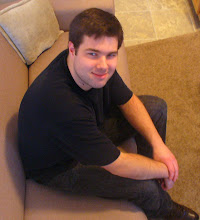Title: Mortal Kombat
Year of Release: 1995
Date Viewed: August 14th, 2011
MPAA Rating: PG-13
Mortal Kombat was a landmark arcade game of the 1990s because it was the game that every kid enjoyed playing even though they weren't supposed to be playing it at all. As an adult in his mid-twenties, I've seen enough movies to have my personal tastes become at least moderately sophisticated. In other words, artistic films are equally appealing as those that are made for cheap thrills. I'm an aspiring film studies student who has many unwatched classics yet to be appreciated. Yet when the chance to upgrade my knowledge came around, I opted for a DVD that I had no business watching. The movie adaptation of Mortal Kombat; a favorite from adolescence that I had the pleasure of watching roughly a dozen times before. It has no innovative direction, no timeless wisdom and plenty of cheap thrills. But sometimes guilty pleasures are so fun that there is no room for regrets. That's why the arcade was so popular to begin with.
In the Kombat universe, inhabited worlds are divided into realms with Earth being only one of several. The elder gods that control these realms cannot legally cross over to others unless their native warriors defeat their enemies ten consecutive times in a once-a-century martial arts tournament called Mortal Kombat. Having lost their previous nine endeavours, Earth is now in jeopardy of Outworld invasion.
The final hope in preserving humanity lies with three mortals who are initially oblivious to their true importance. They enter the Mortal Kombat tournament for personal reasons. Sonya Blade (Bridgette Wilson) is a Special Forces officer on the trail of wanted criminal and murderer Kano (Trevor Goddard). Johnny Cage (Linden Ashby) is a Hollywood action movie star frustrated by press rumors that he uses a stuntman and special effects for his fight scenes. And Liu Kang (Robin Shou) is a former Shaolin Monk out to avenge his brother's death at the hands of sorcerer Shang Tsung (Cary-Hiroyuki Tagawa.) Earthrealm's guardian Lord Rayden (Christopher Lambert) takes a special interest in the three warriors because he senses one of them will be the swing factor in determining Earth's fate. The group journeys to an Outworld island that's literally off the map where they will face nightmarish foes that no one had ever lived to tell about.
The Mortal Kombat franchise had been conceived as an homage to the 1973 martial arts epic Enter the Dragon. The story of warriors gathering at an island for a deadly tournament is very similar to that film. The character of Liu Kang was modeled from the late Bruce Lee. But the true appeal behind the game was the creative thought that went into each character design and the fast-paced ruthless fighting style. The finishing moves were especially brutal and unlike anything that had been seen in mainstream videogames before. For better and for worse, it got people's attention.
The intelligence of videogame fanatics is often underestimated. Rarely is very much serious thought put into movie adaptations of popular games because studios assume flashy fireworks across the screen is all that's needed to please the target audience. The reality of modern games is that the stories are often strong enough to appeal to folks that never even picked up a controller in their life. The Kombat universe was wide enough to invite future expansion (which it certainly did) and stimulate the imagination. Those who pay money to see videogame movies want to see them live up to the visionary quality of the original idea. Fortunately for Kombat fans, screenwriter Kevin Droney and director Paul W.S. Anderson understood this. Unfortunately for them, the ultraviolent finishing moves known as "fatalities" had to be watered down in order to satisfy the PG-13 rating; a guideline probably set in place to draw more teens into the theater. So if the gamer crowd couldn't get a film that looked like Mortal Kombat, they'll have to settle for one that feels like it. Anderson's crew made sure that the fight scenes had impact and that every strike felt important. It's a fine line between fancy kung fu showboating and hard-hitting ferocity. Everything that could be wished for a Kombat movie except the gore.
The casting of Robin Shou was a huge help in reaching that high bar. As an actor, he plays his hero role confidently without the overdramatic mannerisms of Bruce Lee. As a real-life martial arts master, he assisted in some of the fight choreography and carried a good load of the important action sequences. The stunt work is effective enough to hide the lack of experience from Shou's co-stars. But it still remains clear in the final cut that Linden Ashby and Bridgette Wilson were in an inferior league, and as a result, some of their moves looked stiff and awkward. To Ashby's credit though, he hangs tough to participate in the movie's second best fight scene.
The script is very true to the game, but some of the dialogue is questionable. It's odd how the film exhibits confidence in knowing what its audience wants to see yet remains so self-conscious about making sure everyone can follow along. Every time a new character enters the story, there's usually someone there to immediately identify him/her by name. There's no need to spoon feed like this and it's especially annoying to those already familiar with the franchise. Other than that, brains don't really need to be checked at the door, unless you're somehow expecting something realistic from a tale about gods, sorcerers and ten thousand year-old princesses. Mortal Kombat is far from a flawless victory but earns a solid three-round knockout.
Rating: 7


